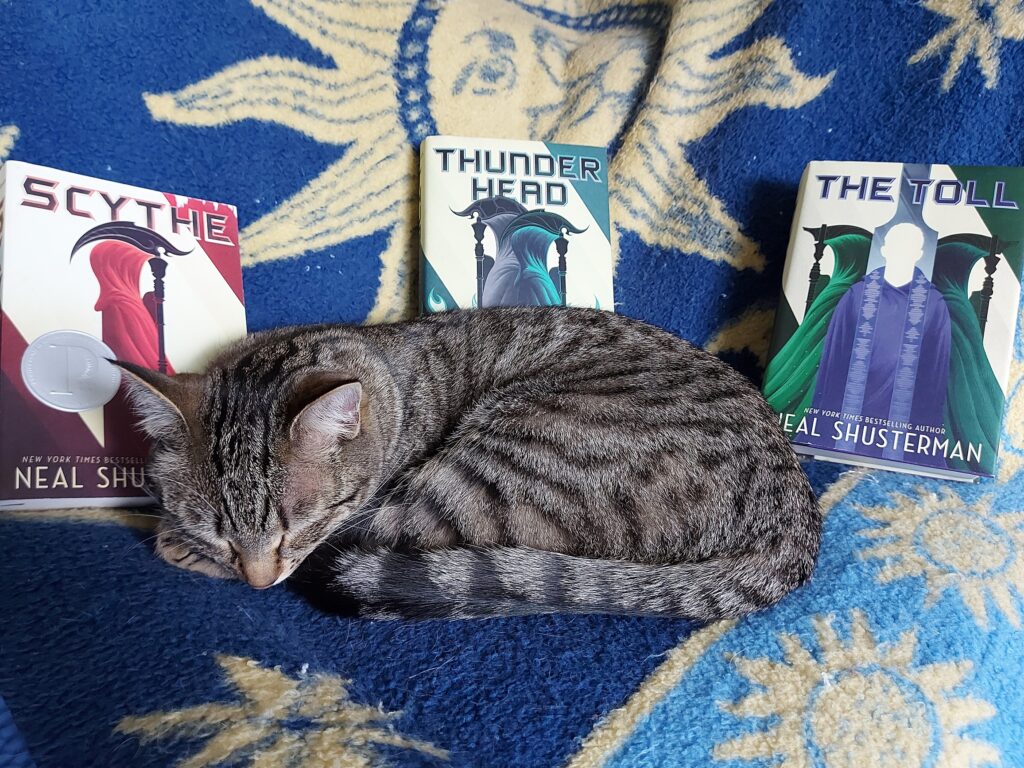The Arc of a Scythe Trilogy by Neal Shusterman

The Arc of a Scythe Trilogy consists of Scythe, Thunderhead, and The Toll. I read Scythe about two years ago and think it is an excellent YA novel. I finally got around to reading Thunderhead and The Toll this past week. This trilogy is easy to read and compelling, full of important themes that YA readers should be reading about, and that some adult readers could probably use a reminder of. Each novel is quite well written, although the second novel, Thunderhead, might be the weakest link. Still, I highly recommend this trilogy.
The Arc of a Scythe Trilogy is set hundreds of years in the future when humanity has conquered death and the world is run by a benevolent AI called the Thunderhead that ensures the world has no poverty, hunger, disease or war. In order to control the human population, scythes were created to take lives. They operate separately from the Thunderhead and under their own jurisdiction – the Thunderhead cannot interfere with them. Scythes are supposed to be humble and compassionate and respect the solemnity of taking a person’s life. In Scythe, though, humanity is at a crossroads when a corrupt new order of scythes begins to flaunt their pleasure in taking lives – basically they are psychopaths with a license to kill.
Citra and Rowan are two teenagers who become apprenticed to the same scythe, Scythe Faraday, who teaches them both the old order of the scythedom, “gleaning” (i.e. killing) with compassion. But after Scythe Faraday disappears and is presumed dead, Citra and Rowan are split up – Citra is apprenticed to Scythe Curie of the old order, and Rowan is apprenticed to Scythe Goddard, who is the leader of the new order. Only one of Citra and Rowan will become a scythe at the end of their apprenticeship and the other will be gleaned. They both believe in the old order of doing things, but they have differing views on how the new order of scythes should be dealt with.
In Thunderhead, the reader gets to see humanity from the Thunderhead’s perspective. With the old order of scythes unable to put down the rise in the new order, the Thunderhead is not liking the direction that humanity is heading in and it basically loses its shit. I was expecting the Thunderhead to turn on humanity Terminator-style, but it really is a benevolent entity that truly wants to help people. Maybe I should stop assuming all AI is out to get us.
In The Toll, characters and plotlines from the previous two novels begin to converge, but religion plays an important role in this novel, considering religion is not really seen as necessary in a “post-mortal” world. The main religion in The Arc of a Scythe novels is Tonism, where believers worship “The Great Resonance” (i.e. God) and choose sound over sight. The Tonist religious practices are basically cobbled together from “pre-mortal” practices. Tonists hate scythes as they believe that gleaning is an unnatural way to die. A Messiah-type figure emerges in an attempt to lead the Tonists away from fighting with the scythedom.
There are a lot of themes at play in The Arc of a Scythe, the most obvious of which is that people should not take pleasure in killing and should respect each other’s right to live. But gleaning becomes more than about enjoying murder under the new order. Scythe Goddard evolves into a Hitleresque figure that uses gleaning to commit genocide on groups of people he and his cronies deem undesirable, including Tonists. Humanity may not be poor, hungry or waging war in the future, but we are still bigoted assholes. Humanity is also still corrupt, not only evidenced by the new order scythes, but also by leadership in the Tonist religion that manipulates their followers and weaponizes them.
The Arc of a Scythe Trilogy questions if humanity even has a purpose once it learns how to cheat death. The Thunderhead ensures that everyone is safe, fed, clothed and sheltered. People do not have to work because the Thunderhead gives everyone an allowance, but the Thunderhead will give people jobs if they want one (even though the jobs are redundant because the Thunderhead does everything). But the people of the post-mortal age are not happier nor are they more imaginative than the people of the pre-mortal age. Is knowing that we will one day die what makes us appreciate our lives? Is it what makes us see the beauty in everything and want to capture it in art, literature, music, etc.? Is our mortality what makes us human?